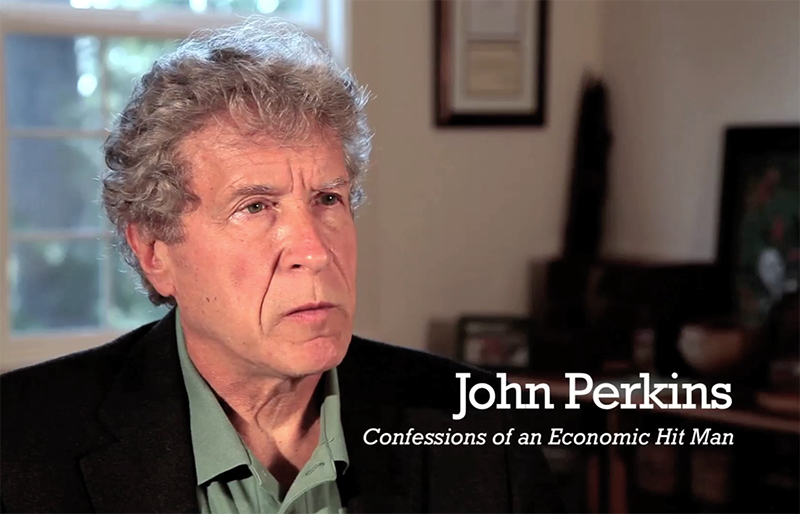
John Perkins, author of ”Confessions of an Economic Hitman” question if Iran planted bombs on the sides of two tankers in the Gulf of Oman. Perkins should have a clue. He used to play a role in the process of economic colonization of Third World countries on behalf of corporations, banks, and the US government. He left the business and became a world leading critic of predatory capitalism.
By John Perkins, JohnPerkins.org | The text comes from John Perkins Newsletter and is republished in NewsVoice with permission by Perkins
“Did Iran plant bombs on the sides those two tankers in the Gulf of Oman? Or is that just another lie, like the US government’s claim that Iraq had weapons of mass destruction?”.
That question was asked of me during an interview on June 14, the day after President Trump asserted to Fox News’s “Fox & Friends” program:
“Well, Iran did do it, and you know they did it because you saw the boat.”
Meanwhile, the president of the Japanese shipping company that owns one of the tankers disagreed, telling reporters:
“The crew are saying it was hit with a flying object. They say something came flying toward them, then there was an explosion, then there was a hole in the vessel. Then some crew witnessed a second shot.”
I have no idea what really happened to those tankers. I have no idea who did it. This blog is not about that. It is about democracy and trust.
Another question I was asked during that same interview:
“Why would Iran attack a Japanese vessel on the day the Japanese prime minister was in Tehran meeting with Iran’s leaders to try to bring Iran and the US to the negotiating table?”
I find it terribly sad that we have to ask such questions. It is deeply disturbing that we wonder whether our government is lying to us about serious issues – in this case, one that could result in a situation that some speculate would lead to WWIII.
Back when America was declaring its independence from England and establishing itself as a democratic republic, Benjamin Franklin, John Adams, and other members of the Continental Congress emphasized the importance of questioning the government. “Leaders are not infallible or above the law; their decisions must be scrutinized and questioned” was a common theme that reflected Congress’s determination not to follow in England’s monarchist and imperialist footsteps. The US Constitution highlights the need for checks and balances and for prohibiting the government from “abridging the freedom of speech, or of the press” (First Amendment).
There is nothing new about deception from those in power. During my lifetime, there have been many presidential lies. For example, President Johnson stepped up the war in Vietnam because, he proclaimed, a US destroyer in the Bay of Tonkin had been attacked by North Vietnamese gun boats (later this information was refuted by the Pentagon Papers, NSA publications, and Secretary of State McNamara’s memoirs). Up until the end of the Vietnam War, the White House and the Pentagon kept insisting that we were winning.
We would learn later that they falsified statistics and that officials from General Westmoreland to President Johnson knowingly deceived us. President Nixon denied his involvement in Watergate, a lie that ultimately led to his resignation. President Clinton was impeached for lying under oath to a grand jury. President George W. Bush and Secretary of State Colin Powell lied to the world about Iraq’s weapons of mass destruction – which did not exist. On and on…
While the above indicates that presidential lies have a long history, this pattern has taken us down into a deeper, darker abyss during the Trump administration. Other presidents lied over serious issues like war and impeachment, but this president lies about – well, just about anything and everything, ranging from President Obama’s birthplace to the amount of money the Saudis paid for US weapons.
According to The New York Times:
”Many Americans have become accustomed to President Trump’s lies. But as regular as they have become, the country should not allow itself to become numb to them. So we have catalogued nearly every outright lie he has told publicly since taking the oath of office. Updated: The president is still lying, so we’ve added to this list, taking it through Nov. 11, and provided links to the facts in each case.”
The long list continues for many pages.
As a child, I was taught the dangers of lying when my parents recited the tale of the shepherd boy who got attention by shouting “Wolf, wolf,” even though there was no wolf. When a wolf did arrive, his cries went unheeded…
The White House obviously has not taken this lesson to heart.
Is the Gulf of Oman tanker incident another lie – or is Iran a real wolf? If not Iran, who? Will we ever know? One thing we can be sure of is that Russia and China would see a US attack on Iran as a threat to them, a provocation that would likely unite them to take actions against us. Thus, the WWIII scenario.
If the accusation against Iran is a lie, it is an extremely dangerous one. If it is the truth, then the questions must be asked:
- Why would Iran take such drastic steps? Does it have anything to do with President Trump’s decision to cancel US commitments to previous treaties?
- Or with economic sanctions?
- What can the US do to deescalate the situation?
- Does the White House want to deescalate, or. . .?
Our world is a fragile place. Many countries possess nuclear weapons that are capable of wiping out life as we know it. Until recently, genuine attempts were made to limit the likelihood of nuclear confrontations by these countries, including Iran, Russia, and the US. Now, such attempts have been undermined and the likelihood of annihilation has escalated.
Democracy is a fragile system. It depends on transparency, honesty, and a citizenry that dares to ask tough questions. We don’t always want to hear the truthful answers, but it is essential that we ask and that we probe for and listen to the truth.
As we navigate another presidential election season, we must be especially vigilant. Incumbents have been known to create crises – like threats of war or even war itself – to bolster support for them. They then tell us that nationalism requires that we show strength, that we “stay the course,” and re-elect them. Staying the course we are presently navigating is likely to bring us to a barren land, a world of utter devastation.
By John Perkins, JohnPerkins.org

 NewsVoice är en oberoende nättidning med utgivningsbevis som startade 2011. Syftet är att publicera nyheter, debattartiklar, kommentarer och analyser.
NewsVoice är en oberoende nättidning med utgivningsbevis som startade 2011. Syftet är att publicera nyheter, debattartiklar, kommentarer och analyser. 